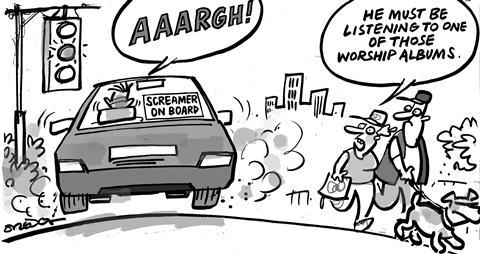There have been times when I’ve viewed God like a cosmic policeman, admits Jeff Lucas. But he isn’t the God of the gotcha. He’s good.

Driving to our church office in Colorado last week, I was momentarily distracted by the worship album I’d downloaded. The music was great, but the rather aggressive leader seemed to think that freedom in worship meant the congregation had to respond, Pavlovian dog-like, to his every order: “Everyone raise your hands in praise…right now!” he barked.
I didn’t respond, not least because I was driving. He then followed that command with a well-worn exchange: “God is good!!” he bellowed. “All the time!” responded the obedient crowd, but apparently with insufficient gusto. “I said…God is good!!!” the leader thundered again.
Mildly irritated by this cheerleading, I suddenly realised that the traffic light ahead of me had turned amber. Should I stop or speed up just a little to get through before it turned red? I choose the latter, but then spotted the police car behind me. Rats. Had I misjudged the traffic light, leading to a little roadside chat with a friendly chap carrying pepper spray and a gun? My heartbeat climbed. My hands grew clammy. I waited for the blaring of a siren and the flashing of lights.
There have been times when I have viewed God like a cosmic policeman – the God of the gotcha. We all have a default view of God, and that view often surfaces in times of suffering. Five months ago, my wife, Kay, was prescribed an antibiotic which causes liver failure in one in 20,000 people. She is that one. Her liver enzymes were so high that our family doctor remarked that he had never seen a person survive with such readings.
Kay and I have had a helpful arrangement in our marriage. When things are tough, she generally handles faith, prayer and calmness, while I take care of the screaming. And not only did I scream, but I wondered: Was God punishing us for something I’d done? Was he mad with me? Did he deliberately inflict this on Kay? Despite the fact that Jesus never told anyone who was suffering that it was part of God’s plan for them, my mind was crowded with confusion. Suffering seeks to place a mask over the face of God, turning his smile into a snarl.
When he spent a final supper with his friends – prior to a 15-minute walk to Gethsemane and then onto the cross – Jesus and his friends sang the Passover hymn (Matthew 26:30, Mark 14:26). The hallel involves singing or reciting Psalms 113-118 and repeatedly affirms the truth that God “is good; his love endures for ever” (Psalm 118:1).

When we suffer, we don’t just need to affirm the existence of God but also declare, sometimes through gritted teeth, the truth about the character of God. He is indeed good.
Just this week Kay heard that her liver enzyme score is now just a little high, but a scan showed no scarring or permanent damage.
Meanwhile, back on the road, I was nearing our church offices. The policeman was still following me. How embarrassing it would be if I entered the church car park hotly pursued by law enforcement. It was then that a brilliant idea occurred: I turned into a rather anonymous-looking housing area. I wasn’t trying to escape the pursuing officer, I just wanted any potential roadside chat to be had in private. As it turns out, he drove straight past. He wasn’t after me at all. I was mightily relieved.
And this truth brings relief too, especially when the circumstances of life are bewildering: God is good. All the time.






































1 Reader's comment